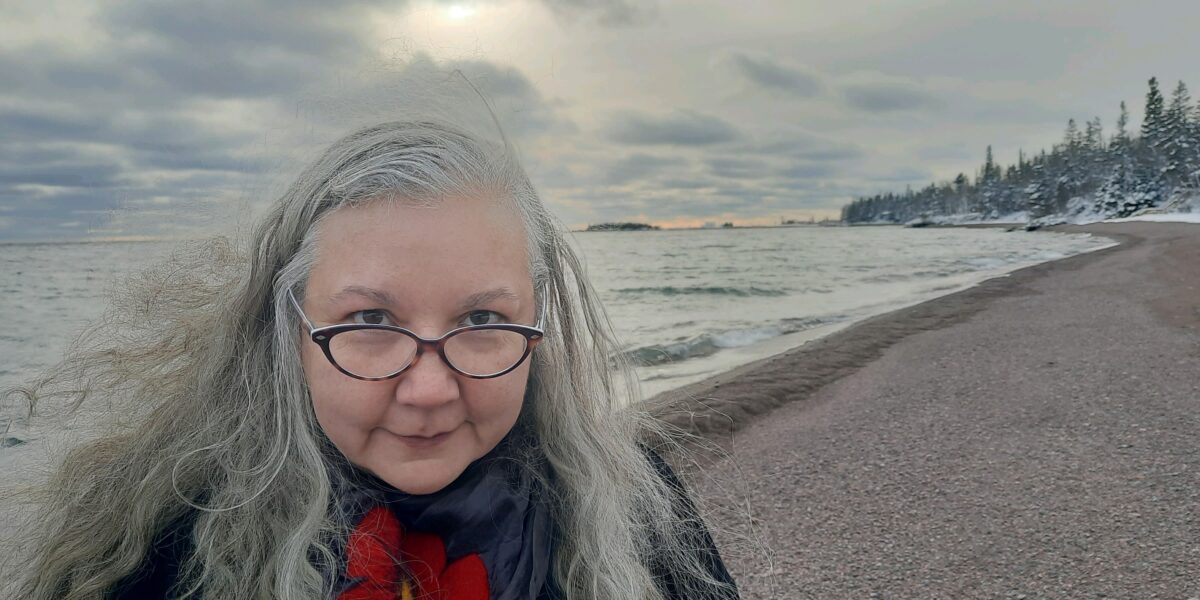On Friday, November 18, for the first time in the history of the state of Minnesota, off reservation land was returned to tribal hands by the state. Barbara Jean Meyers has this report.
The returned land, a stretch of beach along Lake Superior’s North Shore outside Grand Marais, MN, was once part of a larger native settlement known as Chippewa City. The historic occasion was celebrated with a ceremony at the Grand Portage Lodge and Casino. John Morrin, a Grand Portage Tribal Elder, was one of the keynote speakers.
“I heard many stories from my mother and aunts and uncles about growing up in Chippewa City and walking, running, and playing on the beach that we’ve now gotten back. So it’s a very personal day for me and a very historic day for the state of Minnesota, Cook County and the Grand Portage homeland,” said Morrin.
The celebration was also very personal for area historian, author, and Grand Portage tribal descendent Staci Drouillard. Like John Morrin, Chippewa City and was home to many of Drouillard’s ancestors.
“Nishkwakwansing is the Ojibwe name which means the edge of the forest or the place where the trees stand, which is a very, I think, beautiful name for the place,” said Drouillard.
Drouillard’s book, “Walking the Old Road: A People’s History of Chippewa City and the Grand Marais Anishinaabe” came out in 2019. The book helped raise public awareness about the sizable Anishinaabe community that once existed there. Prior to that, many in the non-native community knew it only as Passion Pit Beach—a popular place to hang by the Big Lake not far from town.
“The book was resourced using primarily interviews that I did with elders and ancestors from Chippewa City. It’s a story that could be viewed as a forgotten story, but really, those elders never forgot,” said Drouillard.
In terms of population size, Chippewa City was substantial.
“The elders have said that there were 100 or so families who lived there at one time, more than 200 people, which was by far the biggest community on the North Shore in the late 1800s. The next biggest village probably would have been Duluth,” said Drouillard.
To John Morrin, the relationship between tribes and the state has changed and this land return shows that.
“Over the years there has always been conflict between the state and tribes. But over the years the relationship has grown, and I think the state has grown to respect the history and culture of tribes here in Minnesota,” said Morrin.
April McCormick is the Secretary/Treasurer of the Grand Portage Band. She spoke during the ceremony.
“This is about acknowledging our ceded territory. The state of Minnesota became a state in 1858 so our treaty preexists statehood. So, some of us in this room might think this is about Passion Pit, this is about the county, this is just about Grand Portage., but I would say it is bigger than that. This could lead the way for more partnerships like this in the state of Minnesota with MNDOT and other tribal nations and it’s for that future generation,” said McCormick.
The next generation was also on the mind of guest speaker Levi Brown. Brown is a member of the Leech Lake Band of Ojibwe as well as Tribal Liaison to MNDOT.
“We get to pave a new future. We get to make choices like this that provide a different chapter that our kids get to read that when they get to write their chapter, they’ll be starting from a different level. That’s why I brought my son Jack. He asked why he got school off and I said because we’re going to go listen to some wonderful people talk. At the same time, I want you to see something because you are going to be responsible for carrying on and writing your chapter like this,” said Brown.
Bobby Dechampe is the Grand Portage Tribal Council Chairman. For him, the land returned topped off a historic year of land returns across Anishinaabe homelands.
“To end 2022 like this for Indian country is just unbelievable. Nett Lake got 27,000 acres back. Fond du Lac got Wisconsin Point Back. Now Grand Portage got Chippewa City Back!” said Dechampe.
Barbara Jean Meyers reporting for Minnesota Native News.
Subscribe to Minnesota Native News in your favorite podcast app
- The Sugarbush Tradition Continues in Minnesota’s Urban Areas, and Khayman Goodsky’s New FilmANCHOR Marie Rock: This is Minnesota Native News, I’m Marie Rock. This week, we hear about Minnesotans continuing the old tradition of sugarbush in urban areas. Plus, a look at …
- Sherburne National Wildlife Refuge Faces Staffing Cuts; Headlines Affecting Indigenous MinnesotansANCHOR Marie Rock: This is Minnesota Native News, I’m Marie Rock. This week, we hear about the impact of recent federal staffing cuts on Zimmerman, Minnesota’s Sherburne National Wildlife Refuge. …


 Karen Jones and Stephanie Longfield: Taking Initiative for Future Generations
Karen Jones and Stephanie Longfield: Taking Initiative for Future Generations